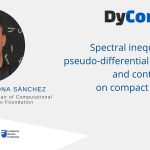Domènec Ruiz-Balet, , Enrique Zuazua. Control of certain parabolic models from biology and social sciences(2022) Math Control and Related Fields, Vol. 12, No. 4, pp 955-1038. doi: https://doi.org/10.3934/mcrf.2022032
Abstract. These lecture notes address the controllability under state constraints of reaction-diffusion equations arising in socio-biological contexts. We restrict our study to scalar equations with monostable and bistable nonlinearities.
The uncontrolled models, describing, for instance, population dynamics, concentrations of chemicals, temperatures, etc., intrinsically preserve pointwise bounds of the states that represent a proportion, volume-fraction, or density. This is guaranteed, in the absence of control, by the maximum or comparison principle.
Nevertheless, the presence of constraints introduces significant added complexity and produces barrier phenomena that the controls might not be able to overcome.
We focus on the classical controllability problem, in which one aims to drive the system to a final target, for instance, a steady-state, so that the state preserves the pointwise bounds of the uncontrolled dynamics. These constraints may force the needed control-time to be large enough or even make some natural targets to be unreachable.
We develop and present a general strategy to analyze these problems. We show how the combination of the various intrinsic qualitative properties of the systems’ dynamics and, in particular, the use traveling waves and steady-states’ paths can be employed to build controls driving the system to the desired target.
We also show how, depending on the Allee parameter and onthe size of the domain in which the process evolves, some natural targets might become unreachable. This is consistent with empirical observations in the context of minorized endangered languages and species in extinction.
Further recent extensions are presented, and open problems are settled. All the discussions are complemented with numerical simulations to illustrate the main methods and results.

